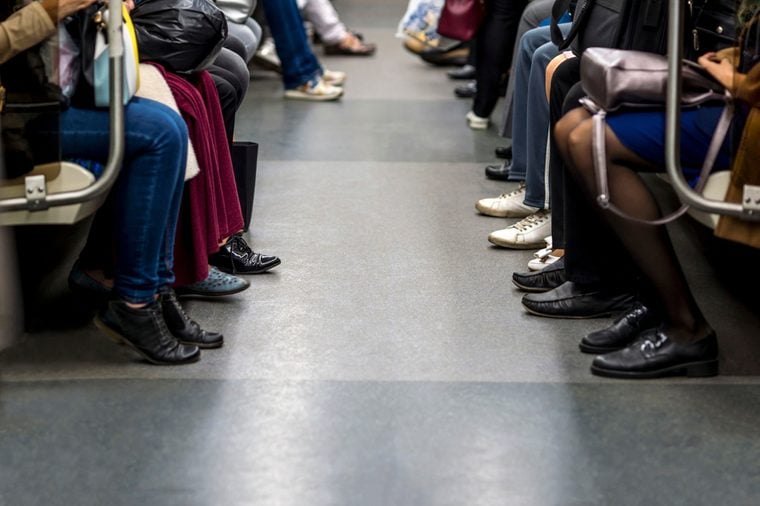
Sitting at a desk all day
A recent study found that a sedentary lifestyle may literally age you. Scientists looked at the telomeres—the ends of the tightly coiled DNA found in every cell—of nearly 1,500 older, post-menopausal women. As our cells divide and age, they lose bits of their telomeres meaning that older cells have shorter telomeres. Each woman wore an accelerometer for one week to measure her physical activity because the researchers wanted to see if exercise affected the cell aging process. Among the inactive women (participants who didn’t get the recommended 30 minutes of daily exercise), those who spent about ten hours or more sitting had shorter telomeres than the women who sat for less time each day. The amount of telomere shortening added about eight more years to the cell’s age of the inactive women who sat for more time than their inactive peers who didn’t sit nearly as long. More research is needed to show how much sitting is safe and how much exercise is needed to curb the potential aging effects of sitting. (Make sure you know the signs that your body is aging faster than you are.)

Working long hours
People who work more than 50 hours a week put themselves at risk for a host of diseases and health conditions. According to a 2012 review paper, observational studies suggested that adults who worked more than 50 hours a week increased their heart disease risk by 40 percent. While another study, that followed people’s employment history for 32 years, found that women upped their risks for heart disease, arthritis, diabetes, and non-skin cancer when they clocked in 60 or more hours of work per week. Late nights at the office can also cause sleep deprivation, which inhibits your brain power from poor memory to concentration loss. “The only two behaviors that seem to enhance the process of clearing out the cellular debris and proteins that are associated with Alzheimer’s disease and dementia from the brain is physical activity, to a certain extent, but primarily sleep,” Azizi Seixas, an assistant professor at NYU Langone Health told CNN. These are the other habits you never knew were aging your brain.

Slouching in your office chair
If you don’t want to feel like an achy 80-year-old, start by fixing your posture. “Poor posture can have many negative effects on your health,” Kenton Fibel, MD, a family medicine physician at Cedars-Sinai Kerlan-Jobe Institute in California told U.S. News. “Having poor posture can put more stress on certain muscles and joints, forcing them to be overworked and causing them to fatigue. Many patients with chronic pain can be helped by addressing their poor posture.” Poor posture while sitting all day can also prevent your body from getting the adequate blood circulation it needs to function, which may lead to the early appearance of varicose veins—the gnarled, enlarged veins commonly seen just under the skin of older adults. Here are 22 more habits that are making you age quicker.

Staring at a computer for hours
About 80 percent of American adults use digital devices for more than two hours a day, according to a report by the Vision Council, a trade group for vision care products and services. In fact, nearly 60 percent of people report having symptoms of digital eye strain such as dry eyes, eye strain, headaches, blurred vision, and neck and shoulder pain. Dry eyes is a common complaint in people older than 50 because tear production tends to diminish as you get older. Fortunately, there are ways to soothe your eyes from the strain of staring at a computer for long periods of time. The “20-20-20 rule” is a good strategy to use: shift your eyes away from the screen every 20 minutes to look at an object 20 feet away for at least 20 seconds. Never eat these 10 foods that can age you.

Your lengthy commute
You may not realize that your two-hour commute is doing a number on your body over time. A recent study on Norwegian railroad employees found that those who traveled for an hour or more for work each way had more health complaints than their peers with short commutes. And workers who had long commutes for more than 10 years also reported more gastrointestinal and musculoskeletal problems like stomach pain and lower back pain compared to people who had long commutes for less than two years. Other research has also found that long commutes have been linked to sleep disturbances, everyday stress, exhaustion, and low ratings of health from self-reports. Authors from another study noted that, “Longer commuting times on public transport imply changes between buses or trains, and thus a higher risk of unpredictable and uncontrollable delays when commuting, which are potential causes of commuting-associated stress.” (Add years back to your life with these brilliant anti-aging secrets.)

Too much sun exposure
You would think that being cooped up indoors at your 9-to-5 protects you from getting skin cancer and wrinkles. However, there are ways that the sun’s rays can still reach you inside, like through your window. A good chunk of UVB rays are blocked out by car windows, but most types of UVA rays, typically associated with aging and skin cancer, can come through. Research has shown that driving has been linked to an increased risk of skin cancer because of this sun exposure from windows. That’s bad news for truck drivers! One study analyzed 85,000 cases of skin cancer and found that a good chunk of them involved the left arm and left side of the face. Another 2015 review from JAMA Dermatology reported that even pilots and cabin crew members are twice more likely to get melanoma, the most dangerous type of skin cancer, than the general population. This may be because airplane windshields and cabin windows can only minimally block UVA radiation much like a car window. Plus, the intensity of UV radiation goes up 15 percent for every additional 900 meters of altitude above sea level. (Watch out for these signs that your face is aging quicker than the rest of you.)

You don’t get along with your coworkers
“When you have a conflict with someone at work, and it’s unresolved and it turns inside you and affects your day, your life outside of work, affects your sleep,” Jody Foster, MD, clinical associate professor of psychiatry in the Perelman School of Medicine at the University of Pennsylvania told the New York Post. “All of these things can add up and absolutely make a person sick.” Researchers backed this claim up in a recent study, which found that workers experienced physical symptoms like headaches and sleeplessness as a result of a colleague’s bad behavior. In turn, your skin can start to sag and wrinkle over time because your body is not getting the rest it needs for your cells to repair and recover. Next, read up on the 50 things that make you look older.